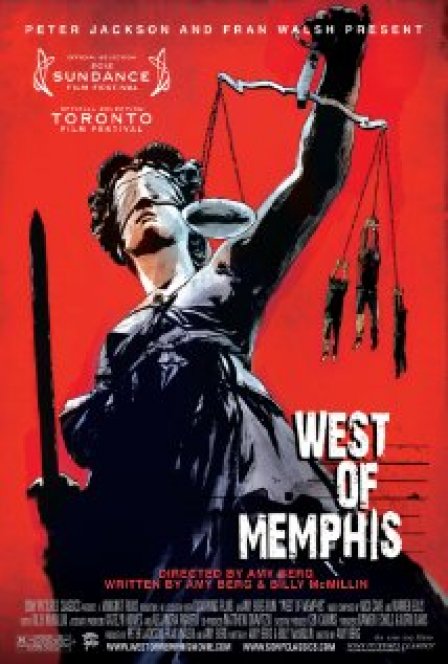For the uninitiated, the West Memphis Three are Damien Echols, Jason Baldwin, and Jessie Misskelley, Jr. They were convicted of murdering three eight-year-old boys in Arkansas in 1994, when they were only teenagers. Two of them, Jason Baldwin and Jessie Misskelley, received life sentences, while Damien Echols was given the death penalty. The boys were outcasts in the small southern town of West Memphis who were interested in witchcraft and heavy metal. They were also (almost certainly) innocent.
A documentary produced by HBO followed the original case and trials as they unfolded. Paradise Lost: The Child Murders at Robin Hood Hills was largely objective but it did seem to reveal that the teens were the victims of a small town witch-hunt and the actual murderer was still at large. The film became a cult hit, bringing widespread attention to the case and garnering the support of celebrities like Eddie Vedder and Henry Rollins. It was followed by two sequels detailing the appeals process and the efforts of the WM3 organization to free the teens, who are now in their thirties. It was during filming of the third Paradise Lost film in August of 2011 that the three defendants entered Alford pleas in exchange for their early release from prison. They had served eighteen years, a cruel reminder of the six childhoods destroyed by the case.
West of Memphis is the newest film on the subject, focusing on the attempts to clear the names of the convicted, find the actual murderer, and reach justice. But, considering there is already an entire trilogy devoted to the West Memphis Three that totals over six hours, is another two-hour plus documentary really necessary? While the answer to that may depend on your own involvement and interest in the case, West of Memphis builds a strong niche for itself, providing background for new viewers while also exploring fresh leads and the latest information regarding the case.
The film examines the personal lives of the defendants as well as the victims’ families, and how the trials, convictions, and media firestorm surrounding the case have affected them. Amanda Hobbs, half-sister to Stevie Branch, for instance, has abused drugs for a number of years (and she was only 21 at the time of filming). She speculates on her abuse problems, claiming they are the result of her attempts “to suppress something, cover something up.” The doc also investigates Terry Hobbs, Stevie Branch’s stepfather, as the potential murder suspect — a bombshell first dropped in Paradise Lost 3: Purgatory. West of Memphis goes well beyond the material presented in that film, examining Terry’s whereabouts on the night of the murder while also pursuing DNA evidence. There is even a scene involving a sting operation to retrieve a sample of Hobbs’ DNA without his knowledge that carries all the familiar beats of a thriller or heist film.
More than once the film juxtaposes scenes of serene small town life with interviews revealing the evil machinations of officials from West Memphis for their own self-gain. State prosecutor John Fogleman and Judge David Burnett have steadfastly maintained the defendants’ guilt, but when the film shows footage from their campaigns for the Arkansas Supreme Court and Senate seats, respectively, it is clear they had reputations to protect. It is a startling reminder that the world we live in is biased and plays favorites. In Burnett’s case, however, his election actually helped the WM3, as he was no longer able to block the defendants’ appeals to hear new evidence.
While the film’s dedication to bringing justice stems from the self-serving attempts at clearing the defendants, it also has the benefit of shifting the focus of the case back onto the three murdered children. From the start, a strong emphasis is placed on the boys, beginning with a detailed timeline of events during their last night alive. An image following the end credits provides an updated version of the “Information is Freedom” billboard (for the WM3 tip line), replacing the pictures of the three defendants with the three victims and updating the message to “Information is Justice.” For the first time in 18 years, the “West Memphis Three” can refer to Christopher Byers, Stevie Branch and Michael Moore.
One of West of Memphis’s few faults is that the filmmakers occasionally neglect to provide sufficient background information. There is, for instance, a sequence in which the film presents fascinating new testimony regarding the knife found in Jason Baldwin’s backyard. The only problem is the knife’s significance is never explained nor is its relation to the case: it must simply be surmised, unless the viewer is already familiar with it from the Paradise Lost films.
For those interested in learning about the case, Paradise Lost: The Child Murders at Robin Hood Hills is still the best place to start, but if you’ve made the journey this far, this latest stop at West Memphis is an enlightening one.

